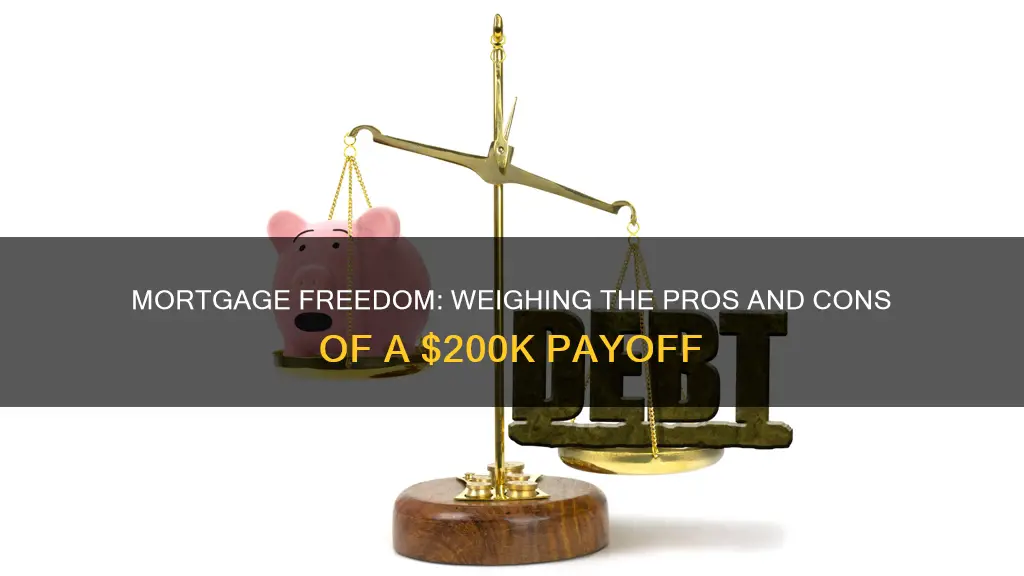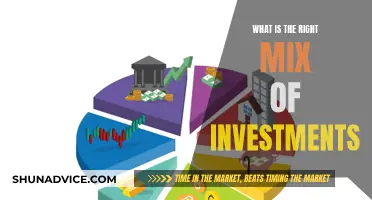
Whether to pay off your mortgage with a $200,000 investment depends on your financial situation, tolerance for risk, and long-term goals.
Paying off your mortgage early can save you thousands in interest payments and give you peace of mind. However, investing your money instead may generate higher returns, especially if you invest in the stock market, which has yielded higher annual returns than the average interest rate on mortgages.
Other factors to consider include the interest rate on your mortgage, the opportunity cost of investing elsewhere, and your proximity to retirement.
| Characteristics | Values |
|---|---|
| Monthly payment for a $200,000 mortgage with a 30-year term and a 6% interest rate | $1,199 |
| Monthly payment for a $200,000 mortgage with a 15-year term and a 6% interest rate | $1,687.66 |
| Total interest paid on a $200,000 mortgage with a 30-year term and a 6% interest rate | $231,676 |
| Total interest paid on a $200,000 mortgage with a 15-year term and a 6% interest rate | $103,788 |
| Pros of paying off mortgage early | Interest savings, peace of mind, build equity |
| Cons of paying off mortgage early | Opportunity cost, wealth tied up, loss of tax breaks, prepayment penalty |
| Pros of investing | Higher returns, liquid investment, employer match |
| Cons of investing | Higher risk, increased debt |
What You'll Learn

Paying off mortgage early vs investing: pros and cons
Paying off a mortgage early or investing a windfall of cash is a complex decision that depends on several factors, including an individual's financial situation, risk appetite, and long-term goals. Here are some pros and cons of each option to help guide your decision:
Paying off Mortgage Early: Pros
- Interest savings: Paying off a mortgage early can result in significant interest savings over the life of the loan.
- Peace of mind: Being debt-free and owning your home outright can provide a sense of financial security and reduce stress, especially for retirees or those approaching retirement.
- Build equity: Paying down the mortgage faster increases the equity in your home, which can be leveraged for refinancing or a home equity loan/line of credit (HELOC).
Paying off Mortgage Early: Cons
- Opportunity cost: Paying off the mortgage early means foregoing potential higher returns from investing the money in the stock market or other financial instruments.
- Wealth tied up in property: Property is an illiquid asset, and selling it to access cash can take months or longer.
- Loss of tax benefits: Paying off the mortgage early may result in losing tax deductions associated with mortgage interest and missing out on tax-advantaged retirement accounts.
Investing instead of Paying off Mortgage Early: Pros
- Higher potential returns: Historically, the average stock market returns have been higher than mortgage rates, offering the potential for greater wealth accumulation.
- Liquid investment: Investing in stocks, bonds, or other market instruments provides easier access to cash compared to tying up money in property.
- Employer match for retirement accounts: Investing in a retirement account may come with an employer match, providing additional funds for compound earnings.
Investing instead of Paying off Mortgage Early: Cons
- Higher risk: The stock market is more volatile than the housing market, and there is a risk of losing money or not achieving the desired returns.
- Increased debt: Choosing to invest instead of paying off the mortgage means carrying the debt for a longer period.
- Psychological discomfort: For some individuals, the idea of constant debt may be unsettling, and they may prioritize becoming debt-free over potential higher returns.
A Balanced Approach:
A balanced approach is to find a middle ground between paying off the mortgage early and investing. This involves making additional contributions towards the mortgage while also allocating funds for investing. This strategy ensures progress in reducing debt and building wealth simultaneously. Additionally, consider the option of refinancing to take advantage of lower interest rates, which can free up more funds for investing.
Invest Now: Where to Put Your Money
You may want to see also

The impact of interest rates
Interest rates play a significant role in determining whether to pay off a mortgage or invest a $200,000 windfall. The decision hinges on a comparison of the interest cost saved by paying off the mortgage early versus the potential investment returns.
Firstly, it's important to understand how mortgage payments are structured. A typical mortgage payment consists of two components: the interest on the loan and the principal amount that reduces the outstanding balance. The proportion of each component varies over time, with a larger portion of the fixed monthly payment going towards interest during the initial years and gradually shifting towards the principal in the later years. This means that paying off a mortgage early can result in substantial interest savings.
However, the opportunity cost of investing the $200,000 instead of paying off the mortgage early should also be considered. If the expected rate of return on investments exceeds the interest rate on the mortgage, investing may be more advantageous. This is because the investment gains could potentially outweigh the interest cost saved by paying off the mortgage early.
The decision is influenced by various factors, including the interest rate environment and the borrower's financial circumstances. When interest rates are low, as they were a few years ago, the opportunity cost of investing elsewhere is lower, making it more attractive to pay down the mortgage. On the other hand, when interest rates are high, as they are now, investing in safe options like Treasury bills, high-yield savings accounts, or CDs that offer competitive rates can be more lucrative than paying off a mortgage with a lower interest rate.
Additionally, the borrower's financial situation and proximity to retirement play a role. For retirees or those close to retirement, reducing or eliminating mortgage debt may be a priority to alleviate the burden of regular payments. In contrast, younger individuals with a longer investment horizon may favour investing the windfall to benefit from the potential for higher returns over time.
Moreover, the tax implications of mortgage interest deductions should be considered. In some countries, mortgage interest is tax-deductible, reducing the borrower's taxable income. By paying off the mortgage early, individuals may lose this tax benefit, impacting their overall financial situation.
In conclusion, the impact of interest rates on the decision to pay off a mortgage with a $200,000 investment is significant. When interest rates are low, paying off a mortgage early becomes more attractive as the opportunity cost of investing elsewhere is lower. Conversely, when interest rates are high, investing the windfall may generate higher returns compared to the interest cost saved. However, individuals should also consider their financial circumstances, proximity to retirement, and tax implications when making this decision.
Invest in Veneck: The Next Big Thing
You may want to see also

How to decide between paying off mortgage and investing
How to decide between paying off a mortgage and investing
Weighing up your options
Whether you've received a windfall, a bonus, or a raise, deciding what to do with extra cash can be tricky. You may be keen to pay off your mortgage early, but investing it could also be a good option. The right answer depends on your tolerance for risk and your long-term goals.
Paying off your mortgage early
Paying off your mortgage early will reduce your debt and relieve you of a constant financial burden. You will also save money on interest payments. However, you will lose out on tax deductions for mortgage interest and your wealth will be tied up in an illiquid asset.
Investing
Investing your extra cash could bring higher returns than paying off your mortgage early, especially if market conditions mean that returns are higher than mortgage rates. Your money will also be liquid, meaning you can easily sell and access your money if you need to. However, investing is higher risk and you will still have the burden of debt.
A compromise
If you can't decide between saving on your mortgage and investing, you could do both. Refinancing to save money on your home loan will allow you to put the rest of your cash into higher-yield investments.
What the experts say
Mark Struthers, CFA, CFP at Sona Financial, LLC, says: "A lot depends on the nature of the mortgage and your other assets. If it's expensive debt (that is, with a high interest rate) and you already have some liquid assets like an emergency fund, then pay it off. If it's cheap debt (a low-interest rate) and you have a good history of staying within a budget, then maintaining the mortgage and investing might be an option."
What to consider
- Your financial situation
- Your tolerance for risk
- Your long-term goals
- Your age
- Your tax deductions
- The interest rate on your mortgage
- The opportunity cost of investing vs paying off your mortgage
Who Really Knows How to Invest?
You may want to see also

The best of both worlds: refinance and invest
Overview
The decision to pay off your mortgage with a $200,000 investment depends on several factors, including your financial situation, risk tolerance, and long-term goals. While paying off your mortgage early can provide benefits such as lower interest costs and peace of mind, investing your money can potentially generate higher returns. Therefore, refinancing your mortgage and investing the difference may be the best option to achieve both goals.
Refinancing and Investing: Advantages
Refinancing your mortgage can offer several advantages, including:
- Lower Interest Rates: By refinancing, you may be able to secure a lower interest rate, especially if market rates have dropped since you took out your original mortgage. This can result in significant savings over the life of the loan.
- Improved Cash Flow: Refinancing into a longer-term loan can reduce your monthly payments, freeing up cash for other financial goals, such as investing or building an emergency fund.
- Access to Equity: Refinancing can provide access to your home equity, which you can use for various purposes, such as consolidating debt or funding home improvements.
- Improved Terms: Refinancing allows you to modify the terms of your loan to better suit your current financial situation. For example, you can switch from an adjustable-rate to a fixed-rate mortgage to lock in a lower rate.
Investing the difference between your refinanced mortgage payment and your previous payment can also offer several benefits:
- Potential for Higher Returns: Historical data suggests that the stock market provides higher returns than the interest saved by paying off your mortgage early. Over time, investing can potentially generate more wealth than simply paying off your mortgage early.
- Diversification: Investing allows you to diversify your portfolio and reduce the risk of putting all your money into a single asset, such as your home.
- Retirement Planning: Investing in retirement accounts, such as an IRA or 401(k), offers tax advantages and helps you save for the future. The power of compound interest makes it advantageous to start investing for retirement as early as possible.
Things to Consider
When considering refinancing and investing, there are a few important factors to keep in mind:
- Risk Tolerance: Investing in the stock market carries the risk of losses, especially in the short term. Ensure that you are comfortable with the potential volatility of the market and that you have a long-term investment horizon.
- Interest Rate Environment: Keep an eye on market interest rates. If rates are low, it may be an opportune time to refinance and lock in a favourable rate.
- Fees and Closing Costs: Refinancing typically involves fees and closing costs, which can offset some of the savings from a lower interest rate. Ensure you understand all the costs involved before proceeding.
- Tax Implications: Consult a tax advisor to understand the tax implications of refinancing and investing. For example, mortgage interest may be tax-deductible, and investing in a retirement account can provide tax advantages.
- Emergency Fund: Before investing, ensure you have an adequate emergency fund to cover unexpected expenses. This will help you avoid the need to liquidate your investments or take on high-interest debt in the event of a financial emergency.
The decision to pay off your mortgage early or invest is a complex one, and the best approach may be to do both. By refinancing your mortgage, you can take advantage of lower interest rates, improve your cash flow, and access your home equity. At the same time, investing the difference allows you to potentially generate higher returns, diversify your portfolio, and save for retirement. However, it is essential to carefully consider your financial situation, risk tolerance, and long-term goals before making any decisions. Consulting a financial advisor can help you navigate the options and choose the best strategy for your specific circumstances.
Capacity Investment: Finding the Right Formula
You may want to see also

When to prioritise paying off mortgage over saving for retirement
The decision to prioritise paying off a mortgage over saving for retirement depends on several factors, including an individual's financial situation, risk tolerance, and long-term goals. While there is no one-size-fits-all answer, here are some scenarios where paying off a mortgage first may be prioritised:
- Reducing Baseline Expenses: If your monthly mortgage payment is a significant portion of your expenses, paying it off can reduce your baseline expenses and provide more financial flexibility during retirement.
- Saving on Interest Payments: Mortgages typically incur substantial interest costs over the long term. Paying off the mortgage early can save you a significant amount of money that can be utilised for other purposes during retirement.
- Higher Mortgage Rate than Risk-Free Returns: Compare your mortgage rate with the after-tax rate of return on low-risk investments, such as municipal bonds. If your mortgage rate is higher, paying it off early can be a better option than investing.
- Peace of Mind: Paying off your mortgage can provide a sense of peace of mind and reduce worries during retirement. It can also increase your financial flexibility.
- Early Stages of Mortgage: Making extra payments during the initial years of your mortgage can help reduce the principal amount on which interest is charged. This can result in significant interest savings over the life of the loan due to compound interest.
- Tax Considerations: Mortgage interest is often tax-deductible if you itemise deductions on your income tax return. Retaining the mortgage can provide a way to reduce the amount you owe in taxes.
- Adjustable-Rate Mortgages: If you have an adjustable-rate mortgage, paying it down early can be advantageous. It will help you build equity, making it easier to refinance to a fixed-rate mortgage in the future if needed.
- Local Real Estate Market: If local real estate values are declining or depreciating, paying down your mortgage can help prevent you from owing more than your home is worth ("going underwater").
However, it's important to note that saving for retirement early is also crucial to take advantage of compound interest. Consider seeking advice from a financial advisor or planner to weigh your options and make an informed decision based on your specific circumstances.
The NFT Investor Club
You may want to see also
Frequently asked questions
Paying off your mortgage early can save you thousands or tens of thousands of dollars in interest payments. It can also give you peace of mind, as you won't have the burden of constant debt.
Any extra money you spend on paying down your mortgage faster is money you aren't able to use for other financial goals, such as retirement savings or an emergency fund. Property is also an illiquid asset, meaning you can't quickly or easily convert it to cash if needed.
The biggest benefit of investing your money instead of using it to pay down your mortgage faster is the potential for higher returns, especially when market conditions mean that returns are significantly higher than mortgage rates. Investing also gives you a liquid asset, which you can easily sell and access if needed.
There is more volatility in the stock market than in the housing market, so there is a higher risk of losing money. Additionally, if you don't like the idea of having debt, choosing to invest your money may not be the best option as you won't actually own your home until the mortgage is fully repaid.







